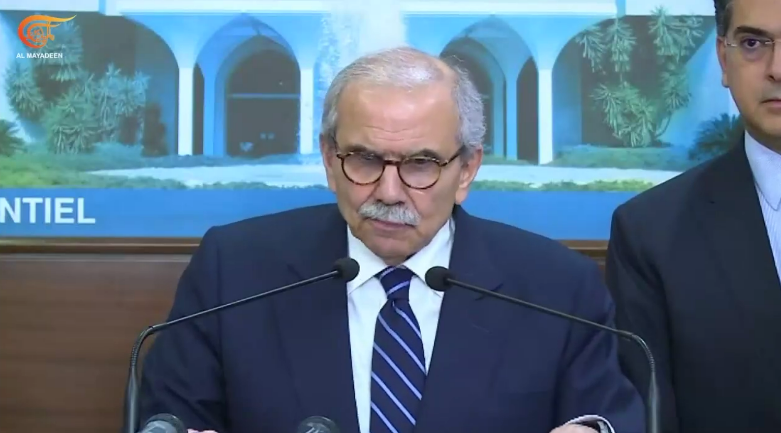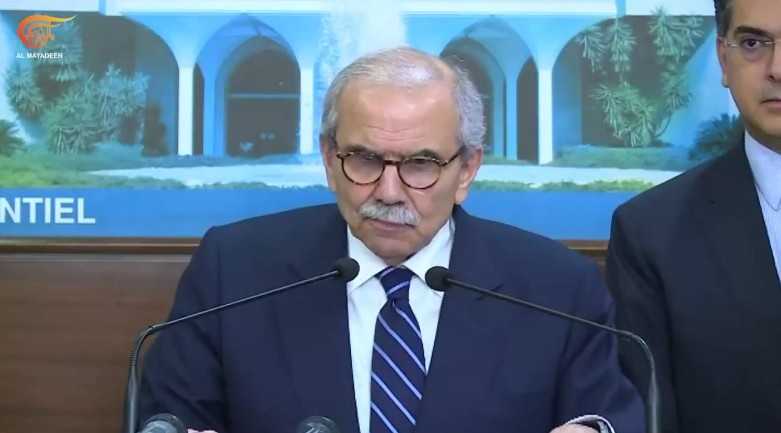 Lebanese Prime Minister Nawaf Salam (al-Mayadeen, August 5, 2025)
Lebanese Prime Minister Nawaf Salam (al-Mayadeen, August 5, 2025)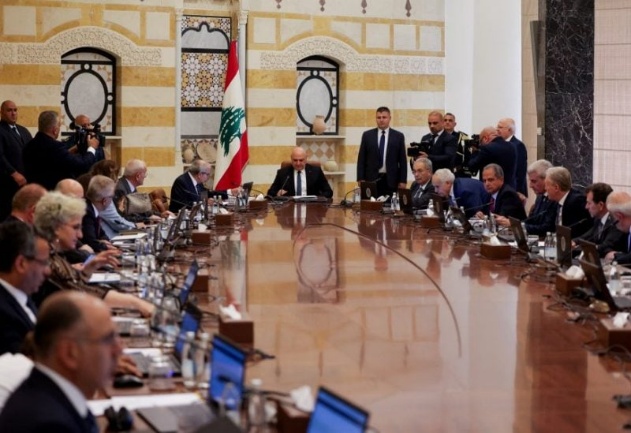 Government discussion on the American document (Beirut International, August 7, 2025)
Government discussion on the American document (Beirut International, August 7, 2025)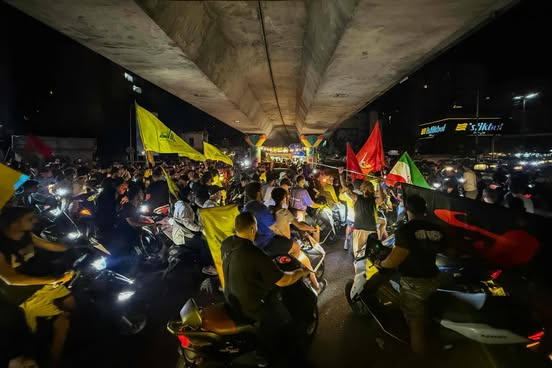 Motorcyclists with Hezbollah flags in Baalbek (Lebanon Debate, August 8, 2025)
Motorcyclists with Hezbollah flags in Baalbek (Lebanon Debate, August 8, 2025)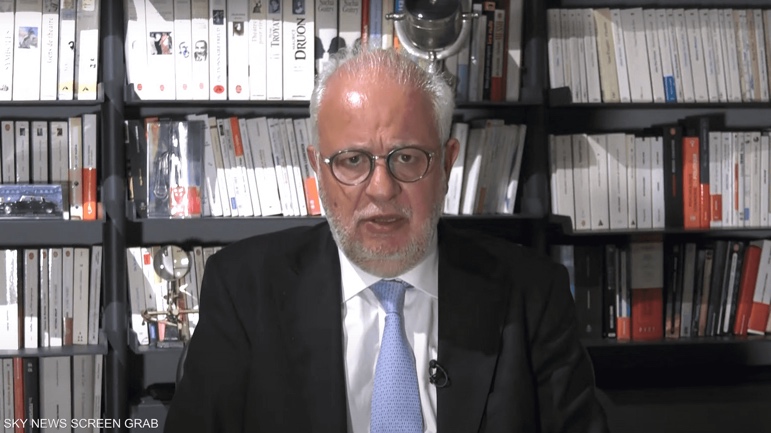 Lebanese justice minister, Adel Nassar (Sky News, August 6, 2025)
Lebanese justice minister, Adel Nassar (Sky News, August 6, 2025)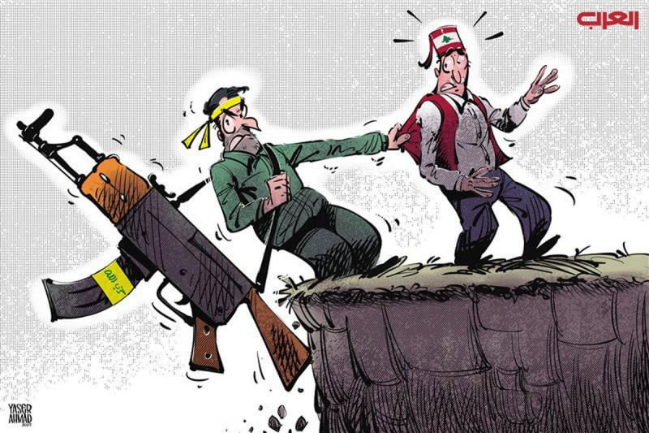 Cartoon by Yasser Ahmad: Hezbollah’s weapons pulling Hezbollah and therefore Lebanon into the abyss (al-Arab, August 5, 2025) Overview[1]
Cartoon by Yasser Ahmad: Hezbollah’s weapons pulling Hezbollah and therefore Lebanon into the abyss (al-Arab, August 5, 2025) Overview[1]
On August 5, 2025, the Lebanese government instructed the army to prepare a plan to disarm all armed militias, including Hezbollah, by the end of the current year. Two days later, the government approved the principles submitted in a document by the American special envoy, Thomas Barrack, which included a timetable for disarmament. Ministers from Hezbollah and Amal left the meetings before they ended.
The president of Lebanon, Joseph Aoun, and the prime minister, Nawaf Salam, noted after the government meetings that the state would implement the state’s monopoly on weapons and ensure its sovereignty over its territory, despite the complexity of the task.
Hezbollah made it clear that it would ignore the government’s decisions and warned that no one could disarm the “resistance.”[2] The organization stated that it was not willing to discuss its weapons before state authorities took action to end the “Israeli aggression.” Hezbollah and Amal were reportedly considering toppling the government in a vote of no confidence in the Lebanese Parliament.
Hezbollah supporters held rallies in its strongholds across the country, while articles in Hezbollah-affiliated media accused Aoun and Salam of acting in the service of the United States and Saudi Arabia.
Hezbollah’s political opponents welcomed the government’s decision to disarm the organization, calling it a “final decision” with which Hezbollah had to comply. They stressed that the weapons in Hezbollah’s hands had only damaged Lebanon.
Senior Iranian officials expressed support for Hezbollah and dismissed the decision to disarm it. In response, the Lebanese foreign ministry condemned Iran’s meddling in internal Lebanese affairs, and politicians called for the expulsion of the Iranian ambassador.
In ITIC assessment, the Lebanese government will continue to exert pressure on Hezbollah and try to continue dialoguing with it so that it obeys the government’s decision and disarms, while the Lebanese army will continue to work with UNIFIL to dismantle Hezbollah’s infrastructure in south Lebanon. However, Hezbollah will find it difficult to cooperate due to the combination of the uncompromising “resistance” ideology against Israel, the expectation of reconstruction funds from Iran, and the fear that its opponents will exploit its disarming to attack the Shi’ite community in Lebanon. As a result, it becomes increasingly likely that internal clashes will begin, which could deteriorate into armed confrontations and harm politicians leading the pro-disarmament line.
The Decisions of the Lebanese Government
On August 5, 2025, the Lebanese government, led by President Joseph Aoun and Prime Minister Nawaf Salam, convened to discuss the state’s exclusive possession of weapons.[3] The first item on the agenda was “completing the discussion on implementing the government declaration to extend the state’s sovereignty over all its territories, by its forces only, and the arrangements for ending hostilities from November 2024,” but it was postponed to the end of the meeting (Beirut International, August 5, 2025).
Prime Minister Salam announced that by the end of August 2025 the Lebanese army had to submit a plan to the government for restricting weapons to the state by the end of 2025, in accordance with the Taif Agreement[4] and UN Security Council Resolution 1701. Salam noted that the decision was based on government guidelines according to which the state was responsible for security and border defense, and on President Aoun’s January 2025 inaugural speech, as well as on the previous government’s decision from November 2024, which called for adherence to the Security Council resolution approving the disarmament of all armed groups in Lebanon. Salam added that all actions would be carried out, in addition to “taking all necessary measures to liberate Lebanese territories from the Israeli occupation, extend the state’s sovereignty over all its territories, and deploy the Lebanese army on the Lebanese border” (al-Jadeed, August 5–6, 2025).

Lebanese Prime Minister Nawaf Salam (al-Mayadeen, August 5, 2025)
Lebanese Information Minister Paul Markaz said that [Hezbollah affiliated] Health Minister Rakan Nasser al-Din and Environment Minister Tamara al-Zein left the meeting before the decision was made because they disagreed with it. However, the two reportedly remained in the government compound, while Administrative Development Minister Fadi Makki, affiliated with the “Shi’ite duo” [Hezbollah and Amal] remained. The two other Shi’ite ministers, Finance Minister Yassine Jaber [Amal] and Labor Minister Mohammad Haidar [Hezbollah], did not attend the meeting (LBCI, Beirut International, al-Nahar, August 5, 2025).
On August 7, 2025, the second part of the government meeting on the state’s monopoly on weapons was held to discuss the document presented by the United States administration’s special envoy, Thomas Barrack. Before the meeting Lebanese media published the content of the document, which includes timetables for disarmament (al-Akhbar, August 6, 2025; Nidaa al-Watan, August 7, 2025):
The first stage will last two weeks, during which government approval is expected for disarming Hezbollah and other “armed organizations” by December 31, 2025. According to the plan, at this stage all military actions by Israel are to cease, the activity of the five-party monitoring committee for the ceasefire will be renewed, Hezbollah’s weapon transfers in various parts of the country will stop, and the Lebanese army will be given access to military facilities throughout the country. In addition, the Lebanese army will begin establishing 15 positions on the southern border with Israel.
The second stage will last about 45 days, during which disarming the armed organizations throughout the country will begin, alongside the deployment of army forces. Israel will begin withdrawing from three of the five control points it holds in south Lebanon, with Lebanese army forces deploying in their place.
The third or “transition” stage will last about 30 days, during which approval is expected for the full withdrawal of Hezbollah forces from all areas south of the Litani River. In addition, the IDF will complete its withdrawal from the last two control points, and civilians will be able to return to villages in the south of the country.
The fourth stage will also last about 30 days, during which all heavy weapons, rocket and grenade launchers, missiles, UAVs, and military observation posts, tunnels, and missile warehouses will be completely dismantled. Approval will be given for the completion of the IDF withdrawal, and Lebanese security forces are to achieve full control south and north of the Litani River.
In addition, the United States will continue the annual funding of $150 million for the Lebanese army and guarantee an additional $1 billion annually for a decade from other donor countries. The document also noted the delineation of the land border between Syria and Lebanon and the fight against drug smuggling through Lebanese territory.
At the end of the government meeting, Information Minister Paul Markaz said the ministers had approved the objectives presented at the beginning of Barrack’s document, which included “taking the necessary steps to fully extend the state’s sovereignty over all its territories, in order to strengthen the role of legitimate institutions, establish the state’s exclusive authority to make decisions on war and peace, and ensure that the holding of weapons be limited to the state alone throughout Lebanon.” He added that they had agreed to “gradually end the armed presence of all non-governmental entities, including Hezbollah, in all Lebanese territories, south and north of the Litani River, while providing support to the Lebanese army and the internal security forces.” The Lebanese army will be deployed in border areas, Israel will withdraw from five points, border issues with Israel and Syria will be resolved, and the issue of prisoners held by Israel will be settled by diplomatic means, including indirect negotiations. The government also agreed to hold an economic conference with the participation of the United States, France, Saudi Arabia, Qatar, and other countries to assist in rebuilding the country. Once again, ministers affiliated with Hezbollah and Amal left the meeting in the middle, but Markaz claimed those ministers were still committed to the government declaration and that it was not a constitutional issue. He said attempts had been made to persuade them to stay in the discussion, but they refused (al-Nashra and the Lebanese government X account, August 7, 2025).

Government discussion on the American document
(Beirut International, August 7, 2025)
President Aoun said the state was determined to ensure its monopoly on weapons. After the first government meeting, he said the authorities were waiting for the Lebanese army’s plan to restrict weapons in order to discuss and approve it. He added that the monopoly would be achieved despite difficulties and obstacles, and that it was not a question of violating Lebanon’s rights or the state’s sovereignty (al-Arabiya, August 7, 2025). The day after the second meeting, Aoun said that there was now hope that Lebanon could emerge from its enormous economic crisis. He said no one could deny that the road was complex but reforms had begun, and the government was working on a series of reforms and laws, some of which it had begun to implement and others which were on their way to approval. He added that the region was currently undergoing tremendous changes, and Lebanon should not sit on the sidelines (Lebanese News Agency, August 8, 2025).
Lebanese Defense Minister Michel Menassa announced that the Lebanese security establishment would implement the decisions of the Lebanese government immediately after the plan to disarm Hezbollah was approved, despite “reservations” (al-Jazeera, August 8, 2025).
Lebanese deputy prime minister Tarek Mitri, considered an independent, said they were dialoguing with Hezbollah, it was agreed that the Lebanese army should be supported and that the political conflict should not turn into an armed confrontation. He claimed Hezbollah had agreed to the ministers’ declaration that weapons would be limited to the state, but the dispute was over how and when the decision would be implemented. Mitri said Hezbollah’s weapons would not be dealt with by force or confrontation, and admitted that they understood the concerns of continued Israeli attacks if disarmament were achieved. He added that they did not trust Israel and that the United States was the guarantor of the ceasefire agreement (al-Jazeera, August 9, 2025).
Hezbollah and Amal
Hezbollah strongly rejected the position of the Lebanese government on its disarmament, which did not receive the support of Hezbollah- and Amal-affiliated ministers, who left government meetings in protest. Hezbollah warned that they would not allow the state to take its weapons, although there was no explicit threat of the use of force. Hezbollah reiterated its usual demand that the authorities take action against the Israeli “violations” before any dialogue could be held on a “national defense strategy” and on the role of the “resistance:”
Alongside the first government meeting, Hezbollah secretary general Na’im Qassem delivered a speech to mark 40 days since the killing of Muhammad Said Izadi, the head of the Palestine Branch in the Qods Force. He claimed the American demand to disarm Hezbollah was an Israeli interest and meant to deprive Lebanon of [military] capabilities. According to him, the state could not currently defend its borders or provide security, and if Hezbollah relinquished its weapons it could not stop the “aggression.” Therefore, he said, the priority now was stopping the “aggression” and not the weapons issue, and Hezbollah would not accept any decision not made on the basis of national consensus. Referring to threats that Israel would increase its attacks in Lebanon if Hezbollah did not disarm, Qassem claimed that it was against Israeli interest for the “resistance,” the army, and the people to defend the state and launch missiles into Israeli territory (al-Manar, August 5, 2025).
After the first government meeting, Hezbollah said that Salam’s government had committed a “grave sin” by deciding to disarm Lebanon in the face of the “Israeli enemy.” Hezbollah claimed the decision weakened Lebanon’s capabilities to stand up to the “ongoing Israeli-American aggression,” and achieved for Israel what it had not achieved in its “aggression” against Lebanon. Hezbollah added that the decision also violated the Lebanese constitution and contradicted the government’s declaration that it was committed to taking all measures to liberate Lebanese territory from the Israeli “occupation,” to extend state sovereignty over all its territory solely by its own forces, and to deploy the Lebanese army in the border area. Hezbollah claimed the government ignored President Joseph Aoun’s commitment to discuss a national security strategy and the decision was “part of a strategy of surrender and negated the foundations of Lebanese sovereignty.” Moreover, the departure of Hezbollah and Amal ministers from the meeting was an expression “of the resistance’s rejection of the decision,” and which would treat it decision “as if it did not exist” (Hezbollah combat information Telegram channel, August 6, 2025). SIMIA, Hezbollah’s social media monitoring unit, launched an online campaign against the government’s decision and Hezbollah called on its supporters to distribute posters with quotes from the statement it published under the hashtag: #Your_decision_as_if_it_does_not_exist (SIMIA, August 7, 2025).
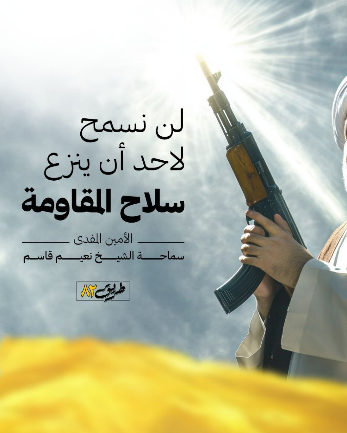
![Notice from Hezbollah's campaign. The Arabic reads, "The decision to take the weapons of the resistance from Lebanon for the Israeli enemy was a constitutional violation, and a violation of the government platform. The weapons of the resistance are part of Lebanon's strength, and they are part of the measures [which must be taken]" (SIMIA, Hezbollah's social media monitoring unit, August 7, 2025).](https://www.newsbeep.com/wp-content/uploads/2025/08/word-image-1754903803641.jpeg)
Right: Notice from Hezbollah’s campaign. The Arabic reads, “The decision to take the weapons of the resistance from Lebanon for the Israeli enemy was a constitutional violation, and a violation of the government platform. The weapons of the resistance are part of Lebanon’s strength, and they are part of the measures [which must be taken]” (SIMIA, Hezbollah’s social media monitoring unit, August 7, 2025). Left: Notice quoting Na’im Qassem’s refusal to give up Hezbollah’s weapons (Hezbollah on the Ground Telegram channel, August 7, 2025)
After the second government meeting the Hezbollah faction in the Lebanese Parliament said in a statement that the government’s decision had been the result of American-Saudi pressure and did not serve the Lebanese national interest. The faction called on the government to act diplomatically and demand that the other side comply with the ceasefire agreement, in accordance with Lebanon’s right to self-defense (al-Manar, NBN, August 8, 2025).
Hezbollah political council member Ghaleb Abu Zainab said that the Lebanese army did not have the necessary weapons to confront Israel or to defend itself. He claimed Hezbollah did not oppose the state’s monopoly on weapons on the condition that the state fulfilled its role. When asked if Hezbollah would give up its weapons for the sake of the state, he replied, “That is not the issue, Hezbollah’s weapons and handing them over are not the dilemma.” He accused the United States and Israel of wanting to turn the Lebanon-Israel problem into an internal Lebanese problem (al-Jazeera, August 7, 2025).
Hezbollah deputy political council chairman Mahmoud Qamati stated that the organization would not hand over its weapons, claiming “no one can disarm the resistance.” He claimed the decision to disarm the organization was “only on paper,” and accused the government of surrendering to foreign pressure. However, he said, Hezbollah adhered to the “right to resist”[5] and to defend Lebanon according to international law. He also noted that Hezbollah was still part of the government (al-Jazeera, August 7, 2025).
Muhammad Raad, chairman of the Hezbollah faction in the Lebanese Parliament, opposed disarmament and claimed the decision was non-sovereign and without national legitimacy. He claimed that relinquishing the weapons would endanger stability and turn the conflict into an internal Lebanese problem, calling it tantamount to suicide and giving up honor, and saying he doubted the government’s guarantees for civil peace. He added that the decision should be postponed until a discussion on an appropriate defense strategy could be held, noting, “We will die and not disarm” (al-Manar, August 8, 2025).
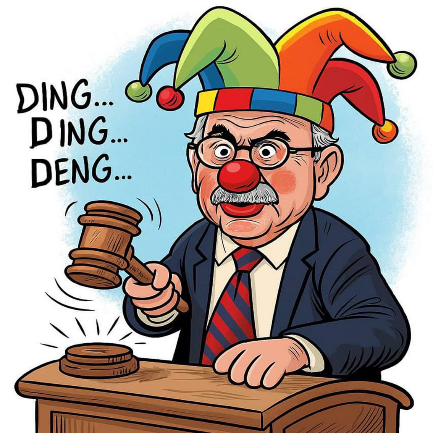
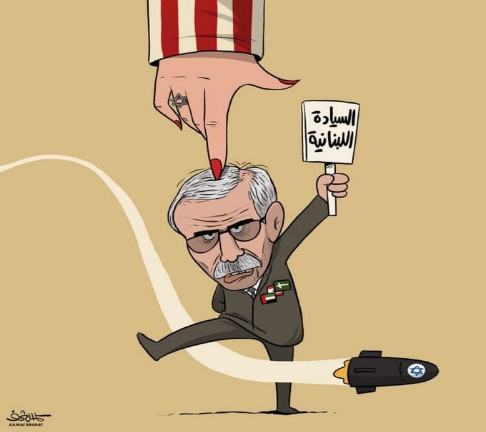
Right: Lebanese Prime Minister Nawaf Salam holds a sign reading “Lebanese sovereignty,” but pinned in place by the United States while ignoring Israeli attacks (cartoon by Kamal Sharaf, Shuhada Ratsda Telegram channel, August 6, 2025). Left: Nawaf Salam as a clown (Hezbollah on the Ground Telegram channel, August 7, 2025)
Amal stood with Hezbollah. Nabih Berri, speaker of the Lebanese Parliament and leader of Amal, said the Amal movement would not agree to any decision made by someone who did not take the Lebanese national interest into account (Naharnet, August 6, 2025). Amal called on the Lebanese government to reconsider its decision in light of the “repeated violations” by Israel of the ceasefire agreement reached last November, adding that the Lebanese government, which it claimed was “rushing to offer further free concessions to the Israeli enemy” through new agreements, should have first focused its efforts on establishing a ceasefire. Amal also claimed that the government was acting contrary to what President Aoun had said in his inaugural speech (al-Mayadeen, August 6–7, 2025).
However, “well-informed sources” reported that the “Shi’ite duo” was continuing consultations to take an appropriate position regarding the government’s decisions and regarding continued participation in the government. Reportedly, “the duo will not respond to those who want to incite and escalate without considering the severe consequences for the homeland, because it refuses to surrender to those planning street explosion scenarios, and this is not out of weakness” (al-Manar, August 8, 2025).
“Political sources in Lebanon” reported that Hezbollah and Amal had political cards they could play if the Lebanese government did not reverse its decision to disarm Hezbollah. They could leave the government and have the 27 members of the Shi’ite block in the Lebanese Parliament vote no confidence, and incite widespread popular activity against the government, since its decision to disarm Hezbollah would be considered aggression against a large segment of the Lebanese and mobilization for war against them (al-Akhbar, August 7, 2025).
In addition to Shi’ite warnings Hezbollah and Amal supporters recently held demonstrations to protest the government’s decisions. Demonstrations were reported in the Dahiyeh al-Janoubia in Beirut, in Baalbek and al-Hermel in the Beqa’a Valley, in Nabatieh, in Tyre, and in various communities in south Lebanon (al-Medan, Lebanon Debate, al-Akhbar, August 5–9, 2025). The Lebanese army erected roadblocks to prevent disturbances. According to a statement, in view of the continuation of the “Israeli aggression” and the sensitive security situation, calls for demonstrations and fake videos intended to stir tensions between citizens were being distributed on social media. According to the statement, the army respected quiet manifestations of the freedom of expression, but would not allow any harm to security or disturbance of public order, blocking of roads, damage to public or private property, and called for unity and solidarity “to get through the dangers facing our country” (Lebanese army X account, August 9, 2025).

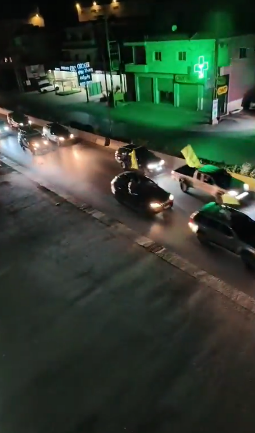
Right: Hezbollah support convoy in Brital in the Beqa’a Valley (al-Nahar, August 7, 2025). Left: Motorcyclists with Hezbollah flags in Baalbek (Lebanon Debate, August 8, 2025)
The Shi’ite mufti of Lebanon, Sheikh Ahmad Qabalan, spoke against the Lebanese government, claiming that the “resistance” was what had “restored Lebanon to itself.” He said the government was a national function, not an open market for American or regional goods, and that “whoever endangers the peace of the citizens thrusts Lebanon into the unknown, and whoever carries his homeland in a bag [sic] has no right to call for the sovereignty of the nation.” Qabalan warned that those who put Lebanon in the heart of a disaster would bear the consequences of their Israel-serving positions. The Lebanese army, he claimed, was a partner of the “resistance,” a comrade in arms and in sacrifice. He warned of a “new May 7”[6] because “the state is like gunpowder, and extinguishing it with gasoline will set all Lebanon on fire” (al-Manar, August 7, 2025).
The Hezbollah-affiliated daily al-Akhbar continued the organization’s hard line against the government’s decision with sharp criticism of President Aoun and Prime Minister Salam. The day after the first government meeting, the newspaper’s editor-in-chief, Ibrahim al-Amin, published an op-ed piece in which he claimed that the decision to disarm Hezbollah was in fact an Aoun-Salam “attempted coup” against the Taif Agreement under the auspices of the United States and Saudi Arabia. He directed most of his criticism at Salam, saying that “what Nawaf Salam did yesterday and what the president and the rest of those present at the government meeting agreed to, serve only one purpose: to topple the framework that governs constitutional and national life in Lebanon.” He did not spare Aoun, saying that although he tried to reach a solution which would please everyone, in practice he “does not intend to take any step that would bring him into confrontation with the Americans and Saudis.” He warned that agreeing to accept the American-Saudi document was nothing but explicit acceptance of “pushing the state, even if gradually, towards an explosion” (al-Akhbar, August 6, 2025).
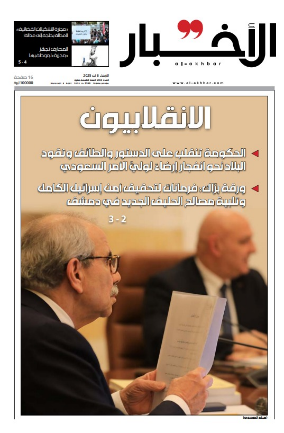
Front page of al-Akhbar the day after the government meeting. The headline reads, “The Revolutionaries.” The sub-head reads, “The government turned its back on the constitution and the Taif Agreement and is leading the state to an explosion to please the Saudi guardian” (al-Akhbar, August 6, 2025)
The Positions of Hezbollah’ Opponents
Hezbollah’s opponents within the Lebanese government and public did not hide their satisfaction with the government’s decisions to disarm Hezbollah and the “armed organizations:”
Lebanese Foreign Minister Yousef Rajji, affiliated with the Christian Lebanese Forces party, said that the government’s decision on restricting weapons was a historic decision which first and foremost met the aspirations of the Lebanese people. He noted that the decision was final and resolute and there was no way back (al-Nashra, August 6, 2025).
Lebanese Minister of Immigration Kamal Chehadeh, affiliated with the Lebanese Forces party, said the Lebanese government would not retreat from the decision regarding the presence of weapons solely in the hands of the state, which served Lebanon’s interest, provided security for the Lebanese people, and would rehabilitate the country. He said it was the first time the Lebanese agreed that the weapons held by the Lebanese militias, especially Hezbollah’s weapons, harmed the country and were no longer of any use (al-Arabiya, August 7, 2025).
Lebanese Justice Minister Adel Nassar, affiliated with the Christian Phalanges party, called to expedite the concentration of weapons in the hands of the state, noting that weapons not owned by the state did not protect Lebanon and caused wars. He said weapons held beyond the framework of the state were inconsistent with state-building, and Hezbollah had to change its position. He noted there was currently no risk of internal confrontation, adding that the government’s decision restored the state’s sovereignty and limited weapons to official entities. He also called for uniting behind the Lebanese army (al-Jazeera, August 8, 2025).

Lebanese justice minister, Adel Nassar (Sky News, August 6, 2025)
Lebanese Forces Party Chairman Samir Geagea, said that after the government’s decision, every armed organization in Lebanon had become illegitimate. He added that the Lebanese government had made its decision, and whether Hezbollah was satisfied or not, it was obliged to carry it out. Geagea said he saluted the Shi’ite ministers for leaving the meeting “democratically” and said all developments were taking place within a democratic framework. He said Hezbollah’s senior officials had acted with minimal responsibility by avoiding confrontations with the army and not using street tactics (al-Jadeed, August 8, 2025).
Abd al-Latif Daryan, the Sunni mufti of Lebanon, spoke by phone with Lebanese prime minister Nawaf Salam and praised the government’s decision, which he said served Lebanon’s interests (al-Nashra, August 6, 2025).
The news site Nidaa al-Watan, known for its strong stance against Hezbollah, published articles praising the government’s decision and opposing Hezbollah. Journalist Najm al-Hashem wrote that Hezbollah could no longer find anyone to defend it and its weapons, and it was trying to claim that if it relinquished them completely, the organization and the Shi’ites would not be able to survive. According to al-Hashem, Hezbollah was mistaken in linking the fate of the Shi’ites to the fate of the weapons, and even senior Shi’ite clerics now making radical statements were doing so because of Hezbollah and were in fact removing themselves from the authority of the state (Nidaa al-Watan, August 6, 2025). In another article, al-Hashem praised the cooperation between President Aoun and Prime Minister Salam and noted that the government’s decisions symbolized a new era for Lebanon, built on the ruins of the eras under Hezbollah control (Nidaa al-Watan, August 9, 2025).


Right: Cartoon by Saer Sabil: the Lebanese government takes weapons from Hezbollah with the caption “Disarming Hezbollah” (Saer Sabil’s X account, August 10, 2025). Left: Cartoon by Yasser Ahmad: Hezbollah’s weapons pulling Hezbollah and therefore Lebanon into the abyss (al-Arab, August 5, 2025)
The International Arena
The United States
United States special envoy Thomas Barrack congratulated Lebanese president Joseph Aoun, Lebanese prime minister Nawaf Salam, and the council of ministers on “making the historic, bold, and correct decision to begin fully implementing the ceasefire agreement, Resolution 1701, and the Taif Agreement.” He added that the decisions would finally implement the “one people, one army” solution for Lebanon and reiterated that the United States stood behind the Lebanese people (Thomas Barrack’s X account, August 7, 2025). Barrack will reportedly return to Beirut in the near future for discussions with Lebanese officials regarding the decision to restrict weapons (al-Arabiya, August 8, 2025). The United States Department of State welcomed the Lebanese government’s decision to instruct the army to prepare a plan to bring all weapons under state control by the end of the year. The State Department spokesperson called it an important step towards achieving Lebanese sovereignty, adding that the administration continued monitoring developments. He said the credibility of the Lebanese government depended on its ability to turn principles into reality (United States Department of State website, August 7, 2025).
Iran
Senior Iranian officials expressed support for Hezbollah and did not hide their dissatisfaction with the Lebanese government’s decision:
Iranian foreign minister Abbas Araghchi dismissed the government’s decision, saying there had been similar ones in the past. He said it was not the first time an attempt has been made to disarm Hezbollah and “the reason for it is clear to everyone – the capabilities of the resistance’s weapons were recently exposed on the battlefield.” He claimed that Iran did not interfere in Hezbollah’s decisions, but only supported it (al-Arabiya, August 7, 2025).
Qods Force deputy commander for coordination affairs, Iraj Masjedi, said disarming Hezbollah was a “failed American-Zionist plan.” He called aspiring to disarm Hezbollah a mistake, and that the “resistance’s” weapons were the weapons of the Lebanese people for defending their territory. He added that the “resistance” forces were always equipped and ready, and that Iran was fully prepared for any possible scenario (Tasnim News Agency, August 7, 2025).
Advisor to Iran’s leader on international affairs, Ali Akbar Velayati, said it was not the first time ideas for disarming Hezbollah had been proposed in Lebanon, but they would fail again and “the resistance” would stand firm against “the schemes.” He claimed that the “resistance” in Lebanon enjoyed support from all sects – Christians, Shi’ites, Sunnis, and others. He said Iran strongly opposed disarming Hezbollah, and claimed that the idea had come from Israel’s belief that Hezbollah had been weakened by the death of secretary general Hassan Nasrallah, but its infrastructure remained “very strong.” He said most Lebanese understood that Hezbollah was what protected them from jihadist elements and from Israel, and that the Lebanese saw what was happening in Syria and understood that they had Hezbollah’s presence to thank for their current security (Tasnim, August 9, 2025).
The Iranian statements caused anger in Lebanon, accompanied with calls to expel the Iranian ambassador and even sever ties with Tehran:
The Lebanese foreign ministry condemned the statements of the Iranian foreign minister and said that the recent statements by Araghchi, in which he related to internal Lebanese issues, were in no way Iran’s concern, were undesirable, reprehensible, and infringed on Lebanon’s sovereignty, unity, and stability, and constituted meddling in its internal affairs and sovereign decisions (Lebanese foreign ministry X account, August 7, 2025).
Christian Phalanges party leader Sami Gemayel said that Iran’s foreign minister was the last person who could give the Lebanese government lessons, and he should “take care of his country and leave us so that we can rebuild what he destroyed.” Gemayel added that Iranian patronage had ended and would not return. He called on foreign minister Yousef Rajji to summon the Iranian ambassador in Beirut as a first step towards his expulsion from Lebanon (Sami Gemayel’s X account, August 7, 2025).
Lebanese foreign minister Yousef Rajji called Velayati’s remarks “blatant and unacceptable meddling in Lebanon’s internal affairs.” He said it was not the first time Iran had meddled in Lebanese affairs, as Iranian officials had repeatedly expressed suspicious positions regarding internal Lebanese decisions that had nothing to do with Iran. Rajji said Lebanon would not allow any external party, whether friend or enemy, to speak on its behalf or claim oversight of its sovereign decisions. He called on the leadership in Tehran to focus on the concerns of the Iranian people and on meeting their needs instead of meddling in matters which did not concern it (Yousef Rajji’s X account, August 9, 2025).
Lebanese Parliament Ashraf Rifi congratulated Rajji on “confronting Iranian insolence in inciting against the state of Lebanon.” He noted that the Iranian ambassador in Beirut should be expelled and ties with Tehran severed. Rifi added that “the person hiding behind the cultural attaché at the Iranian embassy in Beirut was the real commander of the militia, and those who had held the position before him were key figures in all the actions carried out by Iran through its proxies in Lebanon” (Ashraf Rifi’s X account, August 10, 2025).
On the other hand, Ibrahim al-Mousawi, member of the Hezbollah faction in the Lebanese Parliament, said Lebanon had become an open arena because of the government, and when American and Gulf interventions ceased, interventions by other parties would also stop. He said the government itself admitted that it had been under pressure during the discussion of the American document (LBCI, August 9, 2025).
[1] Click https://www.terrorism-info.org.il/en to subscribe and receive the ITIC’s daily updates as well as its other publications.
[2] Hezbollah and the Palestinian terrorist organizations operating in Lebanon.
[3] For further information, see the ITIC weekly report, Spotlight on Terrorism – Hezbollah and Lebanon, July 28-August 5, 2025.”
[4] The Taif Agreement, also known as the National Reconciliation Accord, was signed on October 22, 1989, in Taif, Saudi Arabia, and ended the civil war which began in 1975. For further information, see the March 2005 ITIC report, “The Taif Agreement – Its Main Components and Significance.”
[5] Attack Israel
[6] On May 7, 2008, armed clashes broke out between Hezbollah and its supporters and supporters of the Sunni-led government over the government’s decision to disarm Hezbollah’s communications network. During the clashes, Hezbollah gunmen took control of the Sunni neighborhoods in west Beirut and the clashes spread to other areas of the country. Only after the army threatened to intervene did the fighting gradually subside. The crisis ended on May 21, 2008, with the signing of the Doha Agreement, which in effect granted Hezbollah the ability to veto government decisions by increasing the number of its ministers.
Related Articles

